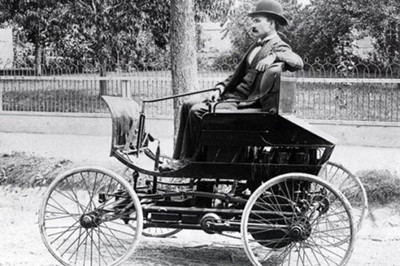On January 29th, 1886, the German engine designer Karl Benz was granted the patent for his first automobile powered by an internal combustion engine.
1886年德國(guó)的卡爾·本茨憑借自己制造的世界上第一輛內(nèi)燃機(jī)動(dòng)力汽車被授予專利。
The day later became known as the birthday of the modern automobile.
此后這一天就成了現(xiàn)代汽車的誕生日。
When Mr.Benz concentrated his intellect on his invention more than 100 years ago, he might never have foreseen the future prevalence of his invention and the transformative effects it would have on human society.
當(dāng)100年前本茨先生將自己過(guò)人的智慧用在自己的發(fā)明上時(shí),他可能永遠(yuǎn)都不會(huì)預(yù)見(jiàn)到他的發(fā)明在未來(lái)的流行及對(duì)人類社會(huì)的變革作用。
In the US, 75% of the households living below the poverty line have at least one car.
在美國(guó)生活在貧困線以下75%的家庭至少都擁有一輛汽車。

China is a late comer to the auto industry, but demand is growing rapidly.
中國(guó)是汽車行業(yè)的后起之秀,但這個(gè)國(guó)家對(duì)汽車的需求正在迅速增長(zhǎng)。
In 2014, more than 23 million vehicles were manufactured and roughly the same number were sold in China.
2014年超過(guò)2300萬(wàn)輛汽車被制造而在中國(guó)的汽車銷售量大致就是這個(gè)數(shù)字。
The number of private cars in China has expanded 35 times since 2000.
中國(guó)的私家車數(shù)量自2000年以來(lái)已經(jīng)擴(kuò)大了35倍。
So, from a historical perspective, what are some of the major influences the automobile has made on human society?
因此從歷史的角度而言汽車已經(jīng)對(duì)人類社會(huì)產(chǎn)生了哪些主要影響?
譯文屬可可原創(chuàng),僅供學(xué)習(xí)交流使用,未經(jīng)許可請(qǐng)勿轉(zhuǎn)載












